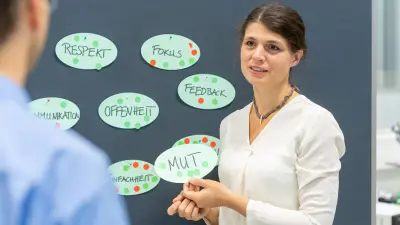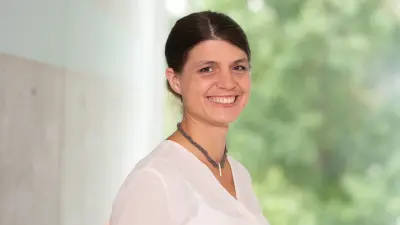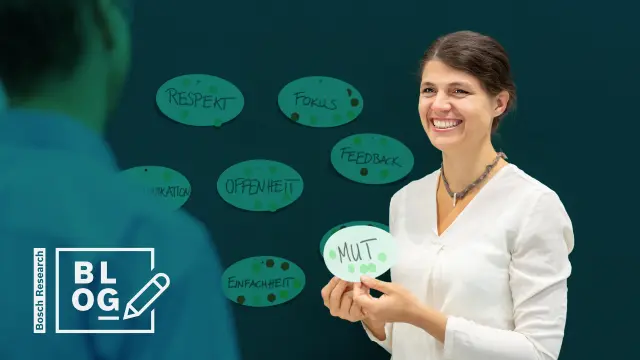Veronika Haug, Dr.
From interface physics in solar cells to agile working methods in industrial research
"Having a physics doctorate and being a mother of three wonderful children is, at first glance, definitely not the “normal” training for my current job as an Agile Master. At second glance it was and is for me personally the perfect preparation for this role."

I initially came to Bosch Research as an expert in thin film solar cells. After that I did research on a whole range of different topics and now, since the start of 2019, I am an Agile Master for various research teams. Here, I use agile working methods to support my teams in producing top results. Agile methods allow us to react flexibly to surprising findings and changing conditions.
Curriculum vitae
- Agile Master, several teams – from sustainability to medical engineering, Robert Bosch GmbH
- (Sub)project manager, various projects from solar cells to electrochemical energy stores, Robert Bosch GmbH
- PhD, Interfaces in Thin Film Solar Cells, Karlsruhe Institute of Technology (KIT) and Center for Solar Energy and Hydrogen Research (ZSW)
Selected publications

V. Haug et al. (2011)
- Veronika Haug, Aina Quintilla, Ines Klugius, and Erik Ahlswede
- Thin Solid Films, 519(21):7464 – 7467

B.J. Mueller et al. (2015)
- Björn J. Mueller, Markus Mock, Veronika Haug, Frank Hergert, Thomas Koehler, Siegmund
- Zweigart, and Ulrich Herr
- Thin Solid Films, 582:284 – 289

H. Shim et al. (2020)
- Hwirim Shim, Özil Budak, Veronika Haug, Mathias Widmaier, Volker Presser
- Electrochimica Acta 2020, 337 135760

C. Karnutsch et al. (2007)
- Christian Karnutsch, Christof Pflumm, George Heliotis, John C. deMello, Donal D. C.
- Bradley, Jing Wang, Thomas Weimann, Veronika Haug, Christian Gärtner, and Uli Lemmer
- Appl. Phys. Lett., 90(13):131104
Interview with Dr. Veronika Haug

Agile Master for various teams in research
Please tell us what fascinates you most about research.
I love discovering new things and understanding, or at least trying to understand, initially non-transparent connections, setting up hypotheses and reviewing, rejecting, and adapting them. In the process, I can enjoy a whole range of different topics. My curiosity has already allowed me to look into many different areas and I am always happy when I can use this curiosity to solve real problems.
What makes research done at Bosch so special?
A large group like Bosch, which maintains a central research department, offers curious people like me a wonderful place to work. The topics as well as the teams are interdisciplinary. So different perspectives and methods are constantly coming together and I am learning from other colleagues every day. The research is also set up in such a way that there is a clear focus on application but at the same time a lot of freedom for new ideas.
What research topics are you currently working on at Bosch?
I am not currently researching in the actual sense. One of my teams is working on intelligent solutions for medical engineering, while another is developing the strategy in the area of sustainability for Bosch Research. I myself have the opportunity every day to learn how people work together, what difficulties may arise, and how they can be overcome. I am pleased that, in this way, I can support others in their research and that I myself can learn so many new things about their topics.
What are the biggest scientific challenges in your field of research?
Accompanying interdisciplinary, diverse teams is always exciting. This diversity, which is so important for the success of a team, often comes with the price that there are stumbling blocks in communication or in cooperation in general. With agile working methods, there is therefore the “better explicit than implicit” principle – it helps when we do not assume that something is a matter of course or that it is always done in this or that way anyway.
How do the results of your research become part of solutions "Invented for life"?
My work always makes only an indirect contribution to research results ultimately becoming technology for life. With agile working methods, we are strengthening the customer focus in our projects and considering at a very early stage what benefit comes from which solution and who this benefit exists for. This increases the likelihood that our research will one day be turned into a product.
Get in touch with me
Veronika Haug, Dr.
Agile Master for various teams in research
